Speaker Paul Ryan says the nation will be ‘living with Obamacare for the foreseeable future’
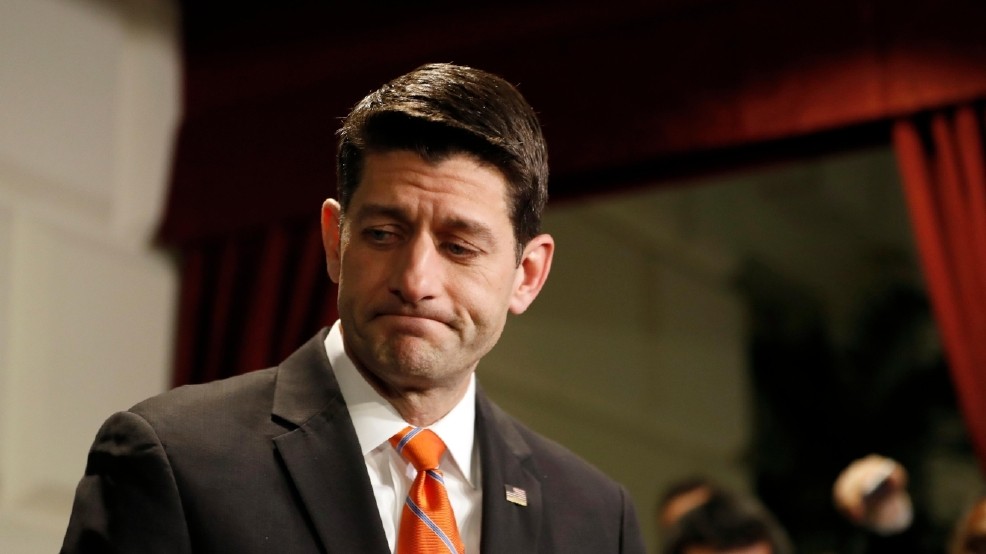
Speaker Paul Ryan says the nation will be ‘living with Obamacare for the foreseeable future’ In a humiliating setback, President Donald Trump and GOP leaders pulled their “Obamacare” repeal bill off the House floor Friday after it became clear the measure would fail badly. It was a stunning defeat for the new president after he had demanded House Republicans vote on the legislation Friday, threatening to leave “Obamacare” in place and move on to other issues if the vote failed. The bill was withdrawn minutes before the vote was to occur. The president’s gamble failed. Instead Trump, who campaigned as a master deal-maker and claimed that he alone could fix the nation’s health care system, saw his ultimatum rejected by Republican lawmakers who made clear they answer to their own voters, not to the president. Republicans have spent seven years campaigning against former President Barack Obama‘s health care law, and cast dozens of votes to repeal it in full or in part. But when they finally got the chance to pass a repeal bill that actually had a chance to get signed, they couldn’t pull it off. What happens next is unclear, but the path ahead on other priorities, such as overhauling the tax code, can only grow more daunting. And Trump is certain to be weakened politically, a big early congressional defeat adding to the continuing inquiries into his presidential campaign’s Russia connections and his unfounded wiretapping allegations against Obama. The development came on the afternoon of a day when the bill, which had been delayed a day earlier, was supposed to come to a vote, come what may. But instead of picking up support as Friday wore on, the bill went the other direction, with some key lawmakers coming out in opposition. Congressman Rodney Frelinghuysen of New Jersey, chairman of a major committee, Appropriations, said the bill would raise costs unacceptably on his constituents. Rep. Barbara Comstock of Virginia, a key moderate Republican, and GOP Rep. David Joyce of Ohio also announced “no” votes. The defections raised the possibility that the bill would not only lose on the floor, but lose big. In the face of that evidence, and despite insistences from White House officials and Ryan that Friday was the day to vote, leadership pulled back from the brink. The GOP bill would have eliminated the Obama statute’s unpopular fines on people who do not obtain coverage and would also have removed the often-generous subsidies for those who purchase insurance. Republican tax credits would have been based on age, not income like Obama’s, and the tax boosts Obama imposed on higher-earning people and health care companies would have been repealed. The bill would have ended Obama’s Medicaid expansion and trimmed future federal financing for the federal-state program, letting states impose work requirements on some of the 70 million beneficiaries. The nonpartisan Congressional Budget Office said the Republican bill would have resulted in 24 million additional uninsured people in a decade and lead to higher out-of-pocket medical costs for many lower-income and people just shy of age 65 when they would become eligible for Medicare. The bill would have blocked federal payments for a year to Planned Parenthood. Democrats were uniformly opposed. “This bill is pure greed, and real people will suffer and die from it,” said Rep. Pramila Jayapal of Washington state. Republished with permission of The Associated Press.
Donald Trump blames Democrats for health bill’s failure
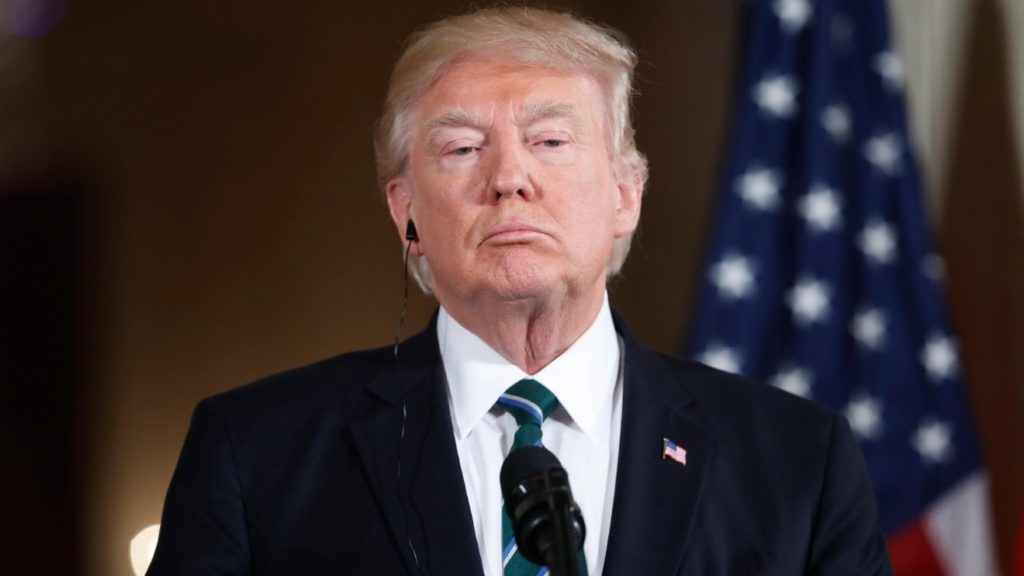
The Latest on an effort in Congress to pass a health care bill (all times local): 4:30 p.m. President Donald Trump says his health care reform fell short because it lacked support from Democrats. Trump made his first comments about the failure of a signature legislative item Friday in the Oval Office a short time after a House vote on the bill was canceled. Trump told reporters “we were very close” and tried to blame Democrats, through Republicans control both the House and the Senate. He also predicted the Affordable Care Act would soon implode, forcing Democrats to join the Republicans at the negotiating table. — 3:30 p.m. President Donald Trump has marked Greek Independence Day with a rather ominous message. At a White House reception, Trump said that in the years to come “we don’t know what will be required to defend our freedom.” But he says it will take “great courage, and we will show it.” Greek Independence Day commemorates the start of the 1821 war that led to Greece’s independence after nearly 400 years as part of the Ottoman Empire. It’s celebrated annually on March 25. Trump told the crowd, “I love the Greeks.” He also introduced Greek-American members of the White House staff, including chief of staff Reince Priebus (ryns PREE’-bus). Trump said Priebus is “really terrific and hard-working,” along with being “one of the top Greeks in the country.” — Republican leaders have abruptly pulled their troubled health care overhaul bill off the House floor, short of votes and eager to avoid a humiliating defeat for President Donald Trump and GOP leaders. House Speaker Paul Ryan, R-Wis., withdrew the legislation after Trump called him and asked him to halt debate without a vote, according to Ryan spokeswoman AshLee Strong. Just a day earlier, Trump had demanded a House vote and said if the measure lost, he would move on to other issues. 1:55 p.m. The White House is no longer expressing confidence that the upcoming House vote on health care will be successful. Instead, spokesman Sean Spicer says President Donald Trump is confident that the White House has done “every single thing possible” to corral the 216 votes needed to pass legislation to repeal the Obama-era health care law. House lawmakers and aides say the bill is short of support before the vote Trump insists be held. The White House says it expects that vote at 3:30 p.m., as scheduled. ___ 1:30 p.m. The White House says it still remains optimistic about a troubled Republican-led health care bill to repeal and replace “Obamacare.” White House press secretary Sean Spicer says President Donald Trump is looking forward to the House passing the bill and it expects the House to vote on the bill later Friday. Spicer says the president is meeting with House Speaker Paul Ryan to “discuss the way forward” on the bill. He says the president has “left everything on the field” on the bill. According to GOP lawmakers and congressional aides, House Republican leaders were short of the votes needed for the bill to pass. ___ 1:20 p.m. House Republican leaders were short of the votes needed for their health care overhaul bill hours ahead of a vote demanded by President Donald Trump. That’s the word Friday from GOP lawmakers and congressional aides as Speaker Paul Ryan met with the president at the White House to deliver the sobering news. Separately, Vice President Mike Pence was meeting near the Capitol with recalcitrant members of the conservative House Freedom Caucus in a last-ditch effort to secure support. Rep. Mark Walker, R-N.C., told reporters, “As of right now, I’m not sure that we are across the finish line. We’ve still got three or four hours and there’s still discussions happening.” ___ 12:40 p.m. Democrats and some veterans’ groups say a provision of the Republican health care bill could raise costs for millions of veterans who use tax credits to buy private insurance. An amendment to the bill would make veterans who are not enrolled in government care ineligible for health-care tax credits. Republicans said the veterans’ provision could be added back into the bill later. Democratic Sen. Tammy Duckworth of Illinois, who lost both legs in combat in Iraq, said Republicans either were “intentionally sacrificing veterans and putting them on a chopping block” or wrote the bill so “haphazardly” they don’t know what’s in it. Minnesota Rep. Tim Walz, the top Democrat on the House Veterans Affairs panel, called the GOP plan “shameful” and said it would leave many veterans without affordable insurance options. ___ 12:30 p.m. House Speaker Paul Ryan is at the White House to brief President Donald Trump on the state of play on the health care bill. The visit comes ahead of a planned showdown vote on the legislation later in the day Friday. The outcome was looking dicey with the legislation apparently still short of votes around midday, and few public signs that the situation was changing. A group of conservative hold-outs had yet to swing in favor despite lobbying from Trump and others, while opposition also came from moderate-leaning and rank-and-file Republicans. The legislation is the GOP’s long-promised bill to repeal and replace former President Barack Obama’s health care law. Trump decided Thursday that negotiations were over and it was time to vote. ___ 12:25 p.m. House Democrats are trying to make the vote on the House GOP health plan personal for their Republican counterparts. After each Republican speaks on the House floor in favor of the bill, Rep. John Yarmuth, D-Ky., cites the number of people in their congressional district who will lose health insurance under the bill. Under the bill, 24 million fewer people will have health insurance by 2026, according to congressional estimates. Rep. Clay Higgins, a Republican from Louisiana, proclaimed that a vote against the bill is “a vote against freedom.” Yarmuth replied that the bill would result in 50,100 people from his Higgins’ congressional district losing health coverage. Republicans disputed the numbers. They
Capstone Agency and Alabama Power holding University of Alabama grant competition

Capstone Agency and Alabama Power are nearing the final stretch of the first phase of the Igniting Innovation grant competition that began on Feb. 20. Igniting Innovation empowers student ideas through a competition by crowdsourcing votes via social media to award grants for service projects that benefit the community. “There is an overwhelming number of organizations who want to make a change, but don’t have the means necessary. They have the ideas, but are lacking the funds. Capstone Agency and Alabama Power want to change that,” said Caroline Shannon, assistant account executive. The grant competition has two phases: Phase one – Student organizations at The University of Alabama have until March 24 to submit their ideas for service projects that will improve the Tuscaloosa community. Alabama Power will evaluate the applications, and the organizations with the top ideas will move on to the next phase. Phase two – Capstone Agency will partner with the organizations to produce videos portraying each service project. Beginning March 27, the videos will be shared on social media, and students and faculty will vote for their favorite and most innovative idea. The winner will be determined by the project that receives the most votes. The winning project will receive a $5,000 grant to put toward the idea. The second place project will receive a $3,000 grant, and the third place project gets a $2,000 grant. Applications are available at https://www.capstoneagency.org/igniting-innovation/. The Igniting Innovation grant competition is part of the “What Powers You?” campaign created by the Capstone Agency-Alabama Power partnership. The partnership provides students with real-world work experience running a campaign and provides Alabama Power with increased transparency and communication with its on-campus consumers. Republished with permission of Alabama NewsCenter.
Re-Invention in Montgomery is an Alabama Bright Light tackling poverty from the inside

Re-Invention has a slogan: “Gorgeous goods for good, as one-of-a-kind as you are!” The slogan goes along with the personality of founder Kellie Guthrie; simple and complex at the same time. Meeting Guthrie is to step into a place reserved for those who believe you can solve problems like poverty from the inside. Guthrie lives somewhere between the grim reality she faces with the women she helps and that place where a solution abounds. She used the word “eradicate” right from the start. “Re-Invention’s mission is to eradicate poverty,” Guthrie said. “What I’ve discovered in my life is that poverty isn’t really a financial issue; it’s a spiritual issue. It’s something that is deep inside somebody. Re-Invention is making the commitment to help those in poverty, whether it’s cyclical or generational. We approach the problem from the inside. We empower these women to change things, and not just to accept things.” Alabama Bright Light Kellie Guthrie helps women in poverty re-invent their lives from Alabama NewsCenter on Vimeo. Re-Invention’s headquarters is in an old firehouse minutes away from Montgomery’s north side, full of fabric rolls and gorgeous pieces of material donated to the center. Guthrie and a dedicated group of women sew and produce products for sale on their website and in markets in the city. These include handbags, pillowcases, ottomans and travel bags. “The ladies that work here are from Montgomery, usually from the north side,” she said. “The way it’s set up over there, there are so many dead ends. Most of these people have never left a 5-mile radius of their home. This is where our social business helps. It’s founded on the traditional business model, but it’s mission based and it solves a problem. All net profits are reinvested back into the business.” Guthrie grew up poor, and when she was able to climb out of poverty she made herself a promise to help those who are stuck in the vicious cycle. One of the highlights of Re-Invention is the Lydia Project, a collaboration with the Nehemiah Center and the Community Ministries of First Baptist Church, where women are prepared for a career in textile manufacturing and upholstering. “Why am I helping women? Because I believe women in poverty situations are definitely second-class citizens and looked down upon,” Guthrie said. “… I have been through a lot in my life, and I have experienced many of the things these women have.” Re-Invention’s “gorgeous goods for good” is tackling poverty from the inside, but its most gorgeous and enduring products are not made of fabric. For more, visit www.re-invention.org/. Alabama Bright Lights captures the stories, through words, pictures and video, of some of our state’s brightest lights who are working to make Alabama an even better place to live, work and play. Award-winning journalist Karim Shamsi-Basha tells their inspiring stories. Email him comments, as well as suggestions on people to profile, at karimshamsibasha@gmail.com. Republished with permission of Alabama NewsCenter.
Alabama unemployment rate drops to 6.2 percent

The Alabama unemployment rate dropped two tenths of a point in February compared with the previous month. According to its preliminary unemployment estimates the Alabama Department of Labor (ADOL) reports 13,205 seasonally-adjusted jobs were added in the private sector last month, which is 30,728 more people employed than February one year ago. That change drops the state’s January unemployment rate of 6.4% down to 6.2%. “We are once again announcing that we have more people working in Alabama than have been over the last eight years,” said ADOL Secretary Fitzgerald Washington. “The labor force continues to grow, showing that jobseekers have confidence in our economy and are willing to enter the job market. Wage and salary employment is fewer than 20,000 jobs away from reaching the two million-mark milestone. We aren’t exactly where we need to be yet, but we are surely getting there.” Alabama’s civilian labor force measured 2,203,868 in February, the highest it’s been since June 2011, when it measured 2,202,354. “All of our counties and metros saw their rates drop this month, and 57 counties and 11 metros saw over-the -year declines,” continued Washington. Counties with the lowest unemployment rates are: Shelby County: 4.5% Elmore County: 5.0% Madison and Lee Counties: 5.2% Counties with the highest unemployment rates are: Wilcox County: 14.9% Clarke County: 11.2% Lowndes County: 10.7% Major cities with the lowest unemployment rates are: Vestavia Hills: 4.0% Homewood: 4.1% Hoover: 4.3% Major cities with the highest unemployment rates are: Selma: 10.8% Prichard: 10.3% Bessemer: 8.5%.
Donald Trump approves Keystone XL, calling it ‘great day’ for jobs

President Donald Trump declared it a “great day for American jobs” on Friday as he formally green-lighted the Keystone XL pipeline, clearing the way for the $8 billion project to finally be completed. In a reversal of the Obama administration’s earlier decision, the Trump administration issued a presidential permit enabling Calgary-based TransCanada to build the pipeline. Appearing alongside TransCanada’s CEO in the Oval Office, Trump called it part of a “new era of American energy policy” that he said would lower costs, reduce reliance on foreign oil and create thousands of U.S. jobs. “It’s going to be an incredible pipeline,” Trump said. “Greatest technology known to man or woman and, frankly, we’re very proud of it.” He said TransCanada could now build Keystone “with efficiency and with speed” and said the federal government was working out final details “as we speak.” The decision caps a years-long fight between environmental groups and energy industry advocates over the pipeline’s fate that became a proxy battle over global warming. It marks one of the biggest steps taken to date by the Trump administration to prioritize economic development over environmental concerns. The State Department, responsible for reviewing the project because it crosses an international border, determined that building it serves U.S. national interests. That conclusion followed a review of environmental, economic and diplomatic factors, the department said. It wasn’t immediately clear what, if anything, had changed since the State Department reached the opposite conclusion two years ago, other than the election of a new administration. President Donald Trump planned to address Keystone during an announcement on Friday morning, White House spokesman Sean Spicer said on Twitter. TransCanada, which first applied for a presidential permit in 2008, called the decision a “significant milestone.” “We greatly appreciate President Trump’s administration for reviewing and approving this important initiative,” said TransCanada CEO Russ Girling. “We look forward to working with them as we continue to invest in and strengthen North America’s energy infrastructure.” But Greenpeace, one of the pipeline’s most vocal opponents, said it sent a signal to the world that the U.S. is “moving backwards” on climate and energy, and pledged to keep fighting it nonetheless. “Keystone was stopped once before, and it will be stopped again,” said Annie Leonard, the group’s U.S. director. The 1,700-mile (2,735 kilometers) pipeline, as envisioned, would carry oil from tar sands in Alberta, Canada, to refineries along the Texas Gulf Coast, passing through Montana, South Dakota, Nebraska, Kansas and Oklahoma. The pipeline would move roughly 800,000 barrels of oil per day, more than one-fifth of the oil Canada exports to the U.S. Portions of Keystone have already been built. Completing it required a permit to cross from Canada into the U.S. Yet even with a presidential permit, the pipeline still faces obstacles – most notably the route, which is still being heavily litigated in the states. Native American tribes and landowners have joined environmental groups in opposing the pipeline. TransCanada said Friday it would continue engaging with “neighbors throughout Nebraska, Montana and South Dakota to obtain the necessary permits and approvals to advance this project to construction.” In an unusual twist, the presidential permit was signed by Tom Shannon, a career diplomat serving in a senior State Department role, rather than by Secretary of State Rex Tillerson. The former CEO of oil company Exxon Mobil recused himself after protests from environmental groups who said it would be a conflict of interest for Tillerson to decide the pipeline’s fate. Canadian Natural Resource Minister Jim Carr said the Canadian government is pleased with the decision. Ninety-seven percent of Canada’s oil exports go to the U.S. “Nothing is more essential to the American economy than access to a secure and reliable source of energy. Canada is that source,” Carr said. Oil industry advocates say the pipeline will improve U.S. energy security and create jobs, although how many is widely disputed. Calgary-based TransCanada has promised as many as 13,000 construction jobs — 6,500 a year over two years — although the State Department previously estimated a far smaller number. The pipeline’s opponents contend the jobs will be minimal and short-lived, and say the pipeline won’t help the U.S. with energy needs because the oil is destined for export. A Trump presidential directive also required new or expanded pipelines to be built with American steel “to the maximum extent possible.” However, TransCanada has said Keystone won’t be built with U.S. steel. The company has already acquired the steel, much of it from Canada and Mexico, and the White House has acknowledged it’s too difficult to impose conditions on a pipeline already under construction. Environmental groups also say the pipeline will encourage the use of carbon-heavy tar sands oil which contributes more to global warming than cleaner sources of energy. President Barack Obama reached the same conclusion in 2015 after a negative recommendation from then-Secretary of State John Kerry. TransCanada first applied for a permit in 2008. Years of politicking, legal wrangling and disputes over the pipeline’s route preceded Obama’s decision to nix the project. The Obama administration argued the pipeline would undercut U.S. efforts to clinch a global climate change deal that was reached weeks later in Paris. The Trump administration has dropped fighting climate change as a priority and left open the possibility of pulling out of the Paris deal. Republished with permission of The Associated Press.
Democrats oppose Neil Gorsuch, say he rules against workers
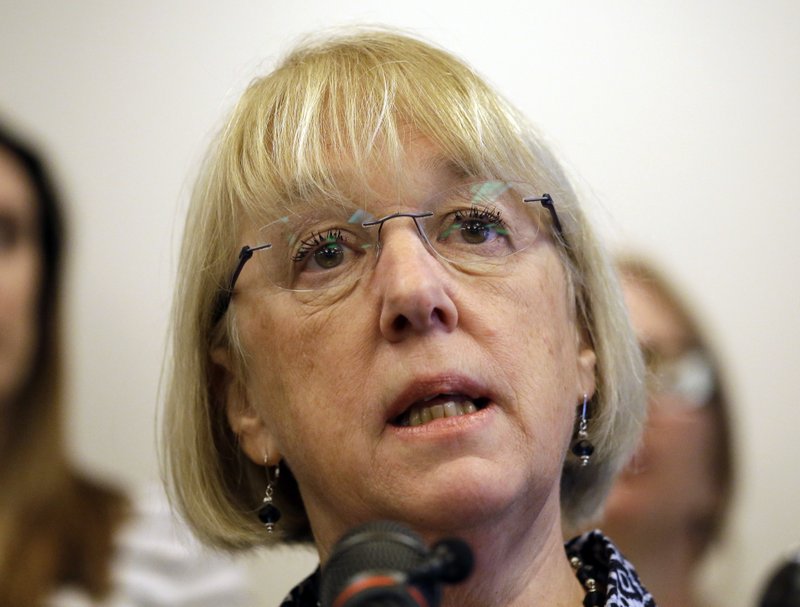
Three additional Democrats said Friday that they will vote against Supreme Court nominee Neil Gorsuch and will support a filibuster against him. California Sen. Kamala Harris and Washington Sen. Patty Murray both said that they believe the Denver-based appeals court judge has ruled too often against workers and in favor of corporations. New Mexico Sen. Tom Udall said Gorsuch had failed to convince him he’d be an independent voice against President Donald Trump, who nominated Gorsuch in January. “The stakes don’t get any higher,” Harris said in a piece in the San Francisco Chronicle. “Some argue that if a nominee has a stellar legal resume, he or she is qualified to sit on the bench and our job is done. I disagree. As U.S. senators, we have an obligation to also examine a nominee’s legal approach and ask whether he or she considers the impact of those decisions on our society and the daily lives of our people.” Murray said she also is opposing Gorsuch because of “chaos” in Trump’s administration, pointing to his refugee and travel ban blocked by federal courts and an FBI investigation into the Trump campaign’s connections with Russia. She said those issues have led her to conclude that “I cannot trust that President Trump is acting in the best interest of our country or our democracy and that I cannot support moving forward with his choice for the court.” Udall echoed those concerns and said Gorsuch failed to win him over when the two met. Gorsuch “failed to answer questions that are critical for me — his position on the rights of working mothers, whether women can choose their own health care decisions, LGBTQ rights and dark money in our elections, to name a few,” Udall said. The Senate Judiciary Committee held four days of confirmation hearings this week, including two days questioning Gorsuch. He refused to give his personal views on most any issue, including abortion, campaign finance and others that Democrats questioned him on. But in response to Democratic criticism, he repeatedly said he has often ruled for the “little guy” over corporations. He said several cases in which he has ruled for corporations over workers “don’t represent the body of my work.” He also stressed he’d be an independent voice, saying that “no man is above the law.” Harris, Murray and Udall join several other Democratic colleagues who have said they will vote against Gorsuch, including five Democrats who announced their opposition Thursday. Senate Democratic Leader Charles Schumer was one of those five, and he also said Democrats would try and block the nominee. Still, majority Republicans are expected to ensure that he reaches the bench, perhaps before the middle of April. Republished with permission of The Associated Press.
New Congress, all-GOP, same political divisions
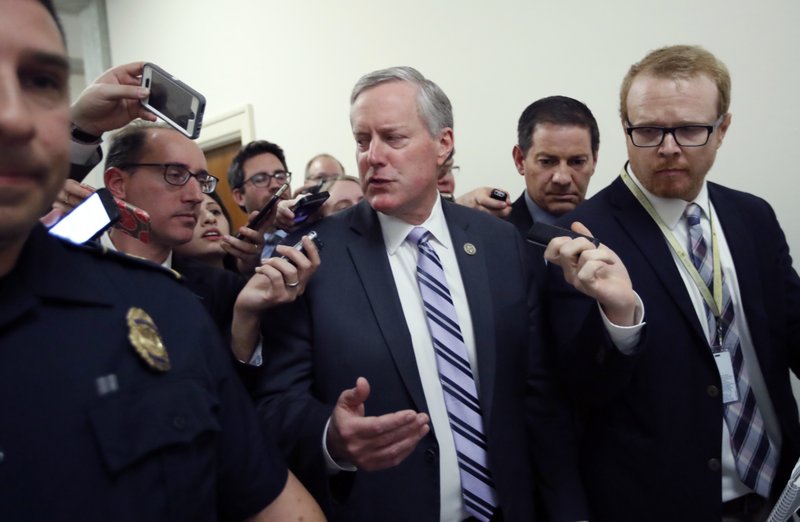
With control of the White House and Senate and a commanding majority in the House, Republicans were supposed to brush off any challenge from the hardline Freedom Caucus and work their will with impunity. But something happened on the way to governing. Now, House Republican leaders are struggling with the same divisions that plagued them under President Barack Obama. The House Freedom Caucus consists of about 30 of the most conservative members, many of whom were elected in the tea party wave of 2010 that surged in opposition to Obama’s Affordable Care Act. In their repeated challenges to GOP leadership, they helped drive former Rep. John Boehner from the speakership. Now they hold the fate of President Donald Trump‘s agenda in their hands. The House was scheduled to vote Thursday on a bill that would repeal and replace Obama’s health law. But House leaders delayed the vote because critics from the left and right were reluctant to support it. Some conservatives, including the Freedom Caucus, say the bill looks too much like Obama’s health law, with the federal government mandating the kinds of coverage that insurance companies must provide. More moderate Republicans are concerned that many of their constituents would lose coverage, and that older taxpayers would face higher premiums. The Freedom Caucus is headed by Rep. Mark Meadows, an affable Republican from North Carolina. After rejecting Trump’s latest offer on the bill, he pledged to work with the president to reach an agreement. “We’re committing to stay as long as it takes to get this done because the president has promised this to the people, we’ve promised it to the American people,” Meadows said. “So whether the vote is tonight, tomorrow or five days from here, the president will get a victory because I believe we all want to negotiate in good faith and deliver on the promise for the president.” If the Freedom Caucus falls in line, it can help hand Trump a major victory on health care, boosting the president’s standing to take on other tough issues. If it stands defiant, it can kill the Republican heath care bill while raising fundamental questions about the GOP’s ability to govern in Washington, even with a 237-193 House majority (there are five vacancies). If Republicans can’t agree on repealing and replacing a health care law they loathe, what can they agree on? “In my view this is the first real test of whether we’re a governing party — and it’s a pretty big test,” said Kevin Cramer, R-N.D., who supports the bill. The measure would repeal major parts of Obama’s health law, capping future funding for Medicaid and cutting tax increases for high-income families, health insurance companies and drug makers. The bill repeals tax credits that people can use to purchase health insurance and replaces them with a new tax credit that is less generous for most. Trump has taken the lead in lobbying the Freedom Caucus, inviting members to the White House multiple times this week. At a meeting Thursday, a White House official posted a picture on Twitter saying the Freedom Caucus gave Trump a standing ovation when he entered the room. One member of the caucus, Rep. Mo Brooks, R-Ala., isn’t likely to fall in line. He called the health bill “the biggest Republican welfare plan in the history of the party.” It’s not. That honor falls to the Medicare Part D prescription drug plan passed under President George W. Bush. Republished with permission of The Associated Press.
House sets risky health care vote after Donald Trump demands it
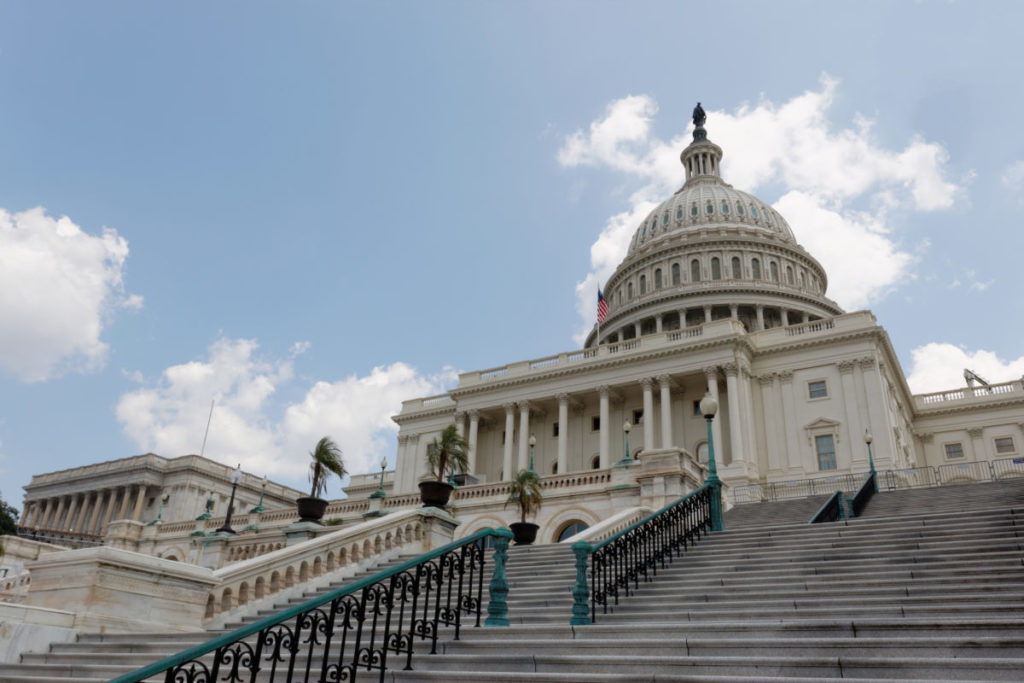
In a gamble with monumental political stakes, Republicans set course for a climactic House vote on their health care overhaul after President Donald Trump claimed he was finished negotiating with GOP holdouts and determined to pursue the rest of his agenda, win or lose. House Speaker Paul Ryan set the showdown for Friday, following a nighttime Capitol meeting at which top White House officials told GOP lawmakers that Trump had decided the time for talk was over. “We have been promising the American people that we will repeal and replace this broken law because it’s collapsing and it’s failing families. And tomorrow we’re proceeding,” Ryan tersely told reporters after scheduling what loomed as the most momentous vote to date for Trump and for the Wisconsin Republican’s own speakership. In an embarrassing and stinging setback hours earlier, leaders abruptly postponed the vote because a rebellion by conservatives and moderates would have doomed the measure. They’d hoped for a roll call Thursday, which marked the seventh anniversary of President Barack Obama‘s enactment of his landmark health care statute that Republicans have vowed ever since to annul. There was no evidence that leaders had nailed down sufficient support to prevail, nor that their decision to charge ahead was a feint and that they’d delay again if necessary. But they seemed to be calculating that at crunch time, enough dissidents would decide against sabotaging the bill, Trump’s young presidency and the House GOP leadership’s ability to set the agenda, with a single, crushing defeat. “The president has said he wants the vote tomorrow,” White House budget chief Mick Mulvaney told the lawmakers, according to Rep. Chris Collins, R-N.Y., a Trump ally. “If for any reason it goes down, we’re just going to move forward with additional parts of his agenda. This is our moment in time.” Even if they prevail, Republicans face an uphill climb in the Senate, where conservatives and moderates are also threatening to sink it. The GOP bill eliminates the Obama statute’s unpopular fines on those who do not obtain coverage and the often generous subsidies for those who purchase insurance. Instead, consumers would face a 30 percent premium penalty if they let coverage lapse. Republican tax credits would be based on age, not income. The bill would also end Obama’s Medicaid expansion and trim future federal financing for the federal-state program and let states impose work requirements on some of its 70 million beneficiaries. In a bid to coax support from conservatives, House leaders proposed a fresh amendment — to be voted on Friday — repealing Obama’s requirement that insurers cover 10 specified services like maternity and mental health care. Conservatives have demanded the removal of those and other conditions the law imposes on insurers, arguing they drive premiums skyward. Many moderates are opposed because they say the GOP bill would leave many voters uninsured. Medical associations, consumer groups and hospitals are opposed or voicing misgivings, and some Republican governors say the bill cuts Medicaid too deeply and would leave many low-income people uncovered. Republicans can lose only 22 votes in the face of united Democratic opposition. A tally by The Associated Press found at least 32 “no” votes, but the figure was subject to fluctuation amid frantic GOP lobbying. Rep. Mark Meadows, R-N.C., head of the hard-right House Freedom Caucus, said he remained a “no” but didn’t answer when asked whether the group still had enough votes to kill the legislation. He’d long said caucus opposition alone would defeat it without changes. One member of that group, Rep. Paul Gosar, R-Ariz., responded indirectly when asked if his opposition had changed. “Everybody asked us to take a moment and reflect. Well, we’ll reflect,” he said. Other foes said they’d not flipped. These included moderate Reps. Charlie Dent of Pennsylvania, Dan Donovan of New York and Leonard Lance of New Jersey, plus conservative Walter Jones of North Carolina, who had his own words of warning. “He’s there for three-and-a-half more years,” Jones said of Trump. “He better be careful. He’s got a lot of issues coming.” The nonpartisan Congressional Budget Office said changes Republican leaders had proposed before Thursday to win votes had cut the legislation’s deficit reduction by more than half, to $150 billion over the next decade. But it would still result in 24 million more uninsured people in a decade. Obama’s law increased coverage through subsidized private insurance for people who don’t have access to workplace plans, and a state option to expand Medicaid for low-income residents. More than 20 million people gained coverage since the law was passed in 2010. Many who purchase individual health insurance and make too much to qualify for the law’s tax credits have seen their premiums jump and their choices diminished. Republished with permission of The Associated Press.
Darryl Paulson: Do universities discriminate? Promoting ideological diversity, free speech in U.S. universities

In the previous three pieces, I have written about how university hiring policies have led to the virtual exclusion of conservatives on college faculties. We have seen how universities have wrapped students in a protective cocoon to prevent them from hearing speech that might be offensive with the use of speech codes, safe spaces, and micro-aggressions. Finally, we have seen how the academy has abandoned its mission of exposing students to diverse views and it some cases has actually encouraged students to shout down speakers with unpopular views. Can anything be done to encourage universities to fulfill their mission of fostering diversity in all areas, including ideological diversity? This will not be easy, especially in the age of Trump. Liberal college campuses are more likely to dig in their heels and protect the academy from the evils of Trumpism. The situation will probably grow worse, not better in most campuses. We need to foster ideological diversity for the same reasons we need racial and gender diversity. Universities should reflect the communities they represent, and this is clearly not the case today. Former Supreme Court Justice Lewis Powell argued in a 1978 case that diversity was essential to a universities mission. The more diverse the faculty and student body, the more robust will be the exchange of ideas. Yale University law professor Peter Schuck, in his book Diversity in America, contends that faculty have a “higher responsibility to our standards, ourselves and our disciplines that our preferences for ideological homogeneity and faculty-lounge echo chambers betray.” Echoing that sentiment, John McGinnis of Northwestern Law School writes that “liberal ideas might well be strengthened and made more effective if liberals had to run a more conservative gauntlet among their own colleagues when developing them.” The growing conservative attack on higher education by state legislators should come as no surprise. Decades of liberal orthodoxy have led conservative legislators to cut university funding and impose more programmatic controls. Why would any group provide financial support to another institution that constantly demeans conservative ideas and values and refuses to hire them on their faculty? It is in the best interest of universities to improve ideological diversity for two primary reasons: it is the right thing to do, and the university will reap financial benefits. Approaches to ideological Diversity Some universities, including Harvard, Penn State, the University of Texas and others have adopted “conservative coming out days.” I am not sure if this means that faculty who have not come out as conservatives should declare their philosophy, or that universities should seek out conservative faculty through affirmative action. Most conservatives would reject an affirmative action approach. Other universities are showcasing their commitment to ideological diversity by creating a specific faculty line for conservatives. The University of Colorado created an endowed chair in Conservative Thought and Policy. One or two conservative hires hardly indicates a commitment to a diversified faculty. I am not sure that any faculty member wants to be viewed as the “conservative hire.” Will students and faculty come to his or her office to see what a conservative looks like? Some conservatives have pushed for the adoption of the Academic Bill of Rights (ABOR) created by conservative activist David Horowitz and his Center for the Study of Popular Culture. The Bill of Rights contains eight provisions relating to faculty recruitment and hiring, free speech, research and campus speakers. A number of state legislatures have adopted the Academic Bill of Rights over the opposition of the American Association of University Professors, the American Federation of Teachers and several other groups. Critics argue that ABOR “infringes academic freedom in the very act of purporting to protect it.” Money, or the lack of money, is the lifeblood of a university. Some conservatives have urged alumna should withhold financial support for their university until it supports ideological diversity. Universities must end their policies of Groupthink which excludes conservative students and faculty from meaningful participation in university life. Speech codes and safe spaces must end, as well as the coddling of easily offended students. Safe places do not foster education, but create an unreal scenario of what students will face in the real world. Too often, universities have smothered free speech rather than fostering it. When students demand safe places, they often mean I disagree with your ideas, so shut up! Too often, universities have become home to Orwellian offices such as the Office for Diversity and Inclusion. That is fine for groups and ideas that have the universities seal of approval, but it often means the “not welcome” sign is posted for unpopular and undesirable groups. The election of Donald Trump has led to a surge in the sale of George Orwell’s 1984. New print runs have occurred to keep up with the growing demand for the book. I would just remind readers that Orwell’s book was not directed at any specific individual or philosophy, but at authoritarianism in all of its forms. The clash of ideas is the real mission of a university. How can the clash of ideas be heard if not all of the parties are allowed to express their views? How can universities promote diversity in race, gender and sexual orientation, but neglect ideological diversity? Ideological diversity will benefit the university intellectually, as well as financially. We must end the ideological homogeneity that dominates higher education and put an end to what Orwell called “smelly little orthodoxies.” ___ Darryl Paulson is Professor Emeritus of Government at the University of South Florida in St. Petersburg.


